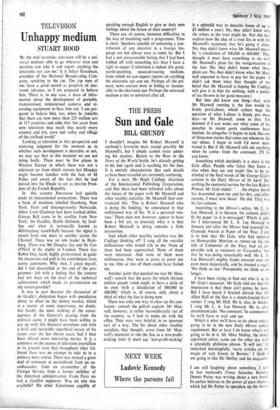Unhappy medium
TELEVISION STUART HOOD
'By the mid-'seventies, television will be a uni- versal medium able to go wherever man and machine can take it and report anything the electronic eye can see.' It is Julian Goodman, president of the National Broadcasting Com- pany, speaking to the cm. The top men of NBC have a good record as prophets of elec- tronic advance, so I am prepared to believe him. There is, in any case, a mass of infor- mation about the development of portable, transistorised, miniaturised cameras and re- cording equipment to bear him out. I am, pre- pared to believe him, too, when he remarks that there are now more than 225 million sets in 117 countries and adds that 'ten years from now television may reach into nearly every country and city, cove and valley and village of the civilised world.'
Looking at television in that perspective and reserving judgment for the moment as to whether such development is desirable of not, we may say that at this moment we are not doing badly. There must be few places in Western Europe in which there was not a television set from which viewers last Monday might become familiar with the face of M Poher and aware of the fact that he had moved into the Elysie to act as interim_ Presi- dent of the French Republic.
In this country Panorama had quickly made its international connections. There was a 'bank of monitors labelled Hamburg, New York, Paris and (incongruously) Newcastle, where Lord Gladwyn had been tracked &rim.. George Ball came in by satellite from New York; the Gaullist, Habib Deloncle, by land- line and what is technically known as BP'llmpfang (catch-ball) because the 'signal is tossed from one mast to another across the Channel. There was an SPD leader in. Ham- burg. There was Mr. Douglas Jay and Sir Con O'Neill in the studio in London. There was Rpbin Day, lucid, highly professional, to guide the discussion and pull in his contributors from across continents. Why then, I asked myself, did I feel dissatisfied at the end of the pro- gramme—left with a feeling that the content had not been on the level of the technical achievement which made its presentation on MY screen possible?
It was in part because the discussion of de Gaulle's abdication began with speculation about its effect on the money market, which is a matter of some importance, no doubt, but hardly the most striking of the conse- qtiences of the General's passing from the pOlitical scene. I might have been willing to put up with this financial exordium and with a brief and inevitably superficial survey of his career over the last eleven years, had I then been offered more interesting matter. It is a comment on the nature of television journal= in its present state that throughout what fol- lowed there was no attempt to take us to a primary news source. There was instead a great deal of comment at secondhand from an ex- ambassador, from an ex-member of the Foreign Service, from a former member of the American administration. FroM Paris we had a Gaullist supporter. Was no one else available? No other Frenchmen capable of
speaking enough English to give us their own feelings about the future of their country?
There are, of course, immense difficulties in the way of mounting such a programme. Time is short. Speakers capable of sustaining a con- tribution of any duration in a foreign lan- guage are not always easy to come by. But I had a not unreasonable feeling that I had been fobbed off with something less than I have a right to expect if television is indeed this great, world-spanning, space-devouring medium, from which we can expect reports on anything the electronic eye can see. Perhaps all the pri- mary news sources were in hiding or inacces- sible to the electronic eye. Perhaps the medium is not so universal after


































 Previous page
Previous page